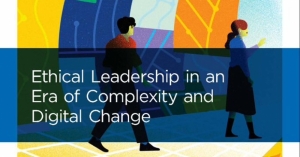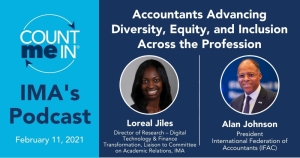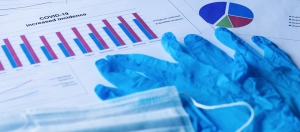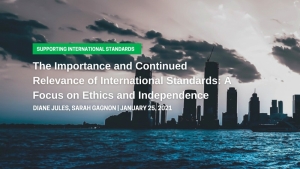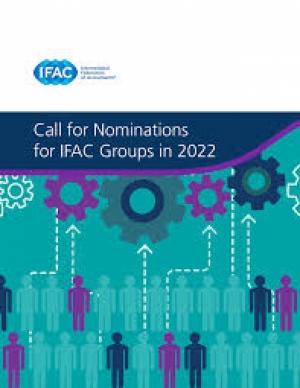عرض العناصر حسب علامة : IFAC
الخميس, 25 فبراير 2021 13:47
القيادة الأخلاقية في عصر التعقيد والتغيير الرقمي
تضافرت جهود كل من معهد المحاسبين القانونيين في اسكتلندا ICAS والاتحاد الدولي للمحاسبين IFAC ومحاسبون قانونيون معتمدون في كندا CPA Canada لتقديم ورشة عمل افتراضية
معلومات إضافية
-
المحتوى بالإنجليزية
Ethical Leadership in an Era of Complexity and Digital Change
Date: Tuesday February 2, 2021 | Time: 9:00AM – 11:00AM EST (COMPLETED)
ICAS, IFAC and CPA Canada joined forces to deliver an exciting virtual workshop exploring how professional accountants (PAs) continue to add value in the digital world. The event was based around an exploratory paper that seeks to drive conversations about:
The shifting landscape resulting from disruptive technologies and societal changes, and the skills that will cement the profession’s value proposition going forward.
The importance of identifying and mitigating bias to maintain objectivity and produce trustworthy information.
The need for the profession to prioritise the development of professional values, ethics and attitudes.
The potential re-focusing needed for PAs to add value in times of increased uncertainty and complexity.
The focus of the event was a series of breakout sessions to explore these themes in greater detail. These sessions were preceded by a number of brief, thought-provoking presentations to prime the conversations.
Speakers:
Charles-Antoine St-Jean, FCPA, FCA, President and CEO, CPA Canada
J Bruce Cartwright CA, CEO, ICAS
Kevin Dancey, CM, FCPA, FCA, CEO, IFAC
Peter Tingling, PhD, CPA, Associate Dean for Undergraduate Programs, Beedie School of Business, SFU
Anne-Marie Vitale, MBA, CPA, CGMA, Chair, IFAC International Panel on Accountancy Education
Brian Friedrich, LL.M, MEd, C.Dir, FCPA, FCCA and Laura Friedrich, MSc, CIA, FCPA, FCCA, Principals, friedrich & friedrich corp.
John C. Havens, Executive Director, IEEE Global Initiative on Ethics of Autonomous and Intelligent Systems
Building on the outputs of this event, the team will develop a thought-leadership paper to provide recommendations and guidance for key stakeholders, including implications for the profession and strategic changes that can be considered by professional accountancy organisations and national standards setters.
نشر في
موضوعات متنوعة
الأربعاء, 21 سبتمبر 2022 12:55
أهمية اتخاذ إجراءات لتحسين التنوع والإنصاف والشمول في مهنة المحاسبة
معلومات إضافية
-
المحتوى بالإنجليزية
BONUS | Alan Johnson - Accountants Advancing Diversity, Equity, and Inclusion Across the Profession
Alan Johnson, President of the International Federation of Accountants (IFAC), joins Count Me In to talk with Loreal Jiles, IMA Director of Research, about the importance of taking action to improve diversity, equity, and inclusion (DE&I) in the accounting profession. On the heels of an IMA and CalCPA-sponsored research study supported by IFAC and 13 other organizations, Loreal shares relevant findings from the research study and Alan recounts personal experiences and offers actionable insights on steps accounting and finance professionals can take to play leading roles in DE&I improvement. Download and listen in for inspiration to act now!
نشر في
موضوعات متنوعة
الخميس, 18 فبراير 2021 12:28
رئيس الاتحاد الدولي للمحاسبين، يشارك أفكاره حول التحديات والفرص التي تواجه المهنة
معلومات إضافية
-
المحتوى بالإنجليزية
Bringing the future into focus
Feb 08, 2021
Alan Johnson, President of the International Federation of Accountants, shares his thoughts on the challenges and opportunities facing the profession, and the priorities for his presidential term.
1. When you joined the IFAC Board in 2015, did you envisage at that time becoming President?
Absolutely not. In fact, I didn’t know much about IFAC until 2011 when I was approached to consider joining the Professional Accountants in Business Committee, which I served on for five years. In 2015, ACCA, my member body, asked me whether I would consider putting myself forward for the board and quite honestly, I had never thought about that – partly because I wasn’t sure I would know what to do given that I didn’t have much knowledge of IFAC beyond my Professional Accountants in Business work. But then, having thought about it, I realised that I probably knew enough. I also realised the value of being a volunteer and giving back to the profession, a profession that had given me a good life and a good career internationally, so I decided to go for it. I knew it would be competitive, and I didn’t honestly expect to get it, but I was selected to my pleasant surprise.
Then, when the call came out for board members to put their names forward in January 2018 for the Deputy President position, I didn’t put myself forward because I genuinely believed that other members of the board deserved to become President and would do a better job than me. But things developed by mid-2018 and I was again asked to consider putting myself forward. It was quite late in the process, but I put my hat in the ring. As they say, the rest is history. I was appointed Deputy President and the more I learnt about the role, the more I felt confident in the role so that, by the time the election for the presidency came around, I felt I was ready.
So, that’s what happened. It wasn’t planned or envisaged. I never expected to get on the board of IFAC, let alone become Deputy President or President, but sometimes things work out.
2. And how has the work of IFAC changed over the five years of your involvement?
The profession faces many challenges, as do all professions today. Number one, we have the scrutiny of the regulators concerning the quality of audit. Sadly, corporate failures will always bring the spotlight onto the audit profession, whether we like it or not. Failures – and I would not necessarily call them audit failures because it is not as if the audit itself failed – arise for various reason, including for example when management deliberately keeps information away from auditors. Now, that is not a good enough excuse to the public because every corporate failure leads to significant loss of jobs, loss of livelihoods, loss of value to investors, and damage to the society in which businesses operate. So, I don’t want to minimise corporate failure; it’s quite serious, and we have an important role in helping prevent it as part of a broader ecosystem.
We also have to demonstrate that we operate ethically, that we act independently, and we do our best to provide independent, high-quality assurance on financial statements. We, therefore, spend a lot of time reinforcing the importance of ethical behaviour, independence and judgement. There’s a firm commitment to operate with sound and robust independence in what we do.
The other thing I would say is that we talk about the auditors when it comes to corporate failure, but we should also think about the professional accountants in the business who are responsible for performance, oversight, risk and governance. We must look at ourselves from within the corporate entities and ask: where are we as professional accountants, and is this a situation where we should blow the whistle? That’s where the profession plays a vital role and that’s why the Code of Ethics for Professional Accountants, which covers not just accountants in practice but also accountants in business and the public sector, are essential as we support our professionals and encourage them to speak out when that is needed and necessary.
You know, we talk a lot about the public interest, but if you asked me 30 years ago, when I was CFO of one of Unilever’s subsidiaries, if my job was a public interest role, I probably would have said no. We have a big role to play in explaining what public interest really means. I think the auditors get it, but I’m not sure whether professional accountants in organisations understand that they have a critical role in protecting the public interest. Yes, they are employees of an organisation. Yes, they are paid by the organisation. And yes, their careers are often dependent on those organisations. But since I got involved with IFAC, I have become aware that I’ve always had a “public interest” role. I always acted in the public interest, but I would not have defined that part of my role as it needs to be clearly defined, especially today in a world of multi-stakeholder capitalism.
So, we have a significant role to play through our member bodies to ensure that our professional accountants understand their unique roles in protecting the public interest. And part of that is making sure that private enterprises operate correctly, ethically, within the law, and do everything that is right for society – not just what is right for shareholders.
3. For many professional accounting organisations, volunteers tend to come from public practice. Given your extensive background in industry, what does the perspective of an accountant in business bring to IFAC’s standard-setting and industry-convening roles?
It’s an interesting question because that was precisely what I had in mind when I had concerns about whether I would be of any use on the IFAC board. Having said that, in all the roles I have had in business, I have always interacted with the profession. I was on the other side of discussions with auditors for many years. I was on selection panels to select auditors. I was the Chief Audit Executive at Unilever for six years and in that time, I engaged regularly with our external auditors. Even though I don’t come from that part of the profession, I understand what they do, what they need, how they operate, their challenges, and their critical role in society. And that’s why I have been able to contribute to the discussions in the Monitoring Group – because I understand the role standard-setting boards play as part of building trust and confidence in financial markets.
When I joined the IFAC board, many colleagues came from the audit and assurance side of the profession. Today, we have a much better balance of people from business and the public sector while retaining expertise from the audit and assurance profession and improving the level of representation for small- and medium-sized practices (SMPs) on the standard-setting boards and IFAC’s advisory groups. If there is one thing we should feel proud of, it is how much more diverse the board is today. I thrive in working with diversity. As a person, you learn a lot more; you become a better leader; you become a better person. By the way, diversity of thought, views, expressions and debate around the table will, more often than not, improve outcomes.
4. A feature of Chartered Accountants Ireland’s membership is the relatively high proportion of our members working overseas. What supports should professional accounting organisations offer to their overseas members to encourage loyalty to their qualification while maintaining standards?
I worked extensively in Europe, Africa and Latin America during my career, but I always had a strong affinity with Ireland through my early career in Unilever when I visited Dublin and other cities frequently. It’s a unique country that has always been a top talent provider around the world and Chartered Accountants Ireland is no exception. The Chartered Accountants Ireland qualification is highly sought-after, so it’s no surprise that there are so many Irish Chartered Accountants working worldwide, either because their companies have moved them or they sought opportunities abroad.
When I look at where we are today, the three things that stand out for me are ethics, leadership and governance. Professional accountancy organisations need to equip their members with these skills wherever they are in the world because reputation takes years to build but can be lost in a flash. We need to protect the profession’s reputation, which boils down to ethics, leadership and governance. It’s also about courage and confidence. So, when I look at what our member bodies need to do, they not only need to support their existing members, they also need to attract the brightest, best and most committed people into the profession because we are a profession of people. Robots and machines might help us be more efficient in some areas, but most of what we do is people-centred and requires good judgement. It’s essential, therefore, that we remain an attractive profession for the next generation.
If I look back at my memories of the profession, I think of long hours, hard work, no work/life balance, travelling a lot if you’re in audit and assurance, terrible for families, terrible for working mothers. Your career might pause if you’re a working mother and you take maternity leave or time away to look after young kids – that role that is still more typically assumed by women, although that is changing. As a result, the accountancy profession is not a natural first port of call for the next generation who want better work/life balance. So we must find new ways of doing what we do – not only more efficiently, but doing different things and often in different ways to make our profession attractive. I think accountancy remains very attractive and when I look at the statistics, we are a growing profession. Many young people in many countries are coming through the professional qualification so we can attract them, and that’s great – but we also have to retain them.
Purpose is a critical element in achieving that. Young Chartered Accountants want to work for an ethical company, as we all do. It’s is not just about rapid career advancement; they want to see the purpose and the impact their organisation – and by extension, they themselves – can have on society. Young people are thinking about purpose much more than I did 40 years ago. It means much more to them, and they will form their views about whom they want to work with, where they want to work, and what work they want to do based on the ethos and the purpose of organisations. And to go back to the point about the public interest, if we can make it clear why our profession is truly a public interest profession, we will remain a very attractive profession in the future.
5. Your predecessor, Professor In-Ki Joo, described the Monitoring Group’s challenges as “among the most difficult circumstances” in his memory. What opportunities do you see for IFAC as the Monitoring Group’s work takes effect?
As you know, the Monitoring Group is a group of international institutions and regulatory bodies that are working to advance the public interest in areas related to international audit standard-setting, audit quality and ethics. The initial Monitoring Group discussions started in May 2015, before I joined the IFAC board, and it remains a feature today. Today we’re in a much better place, and I can see the light at the end of the tunnel.
There will be some changes to the structure of the standard-setting boards and the process to select standard-setting board members. But whatever the outcome is, I think there is a clear recognition that the profession has developed high-quality standards for auditors, professional accountants and the public sector. The question is how we move forward in a changing environment with more agility, more speed, and more diversity – that’s what we’re discussing now.
IFAC and its member bodies will continue to play an important role in the standard-setting process. Why do I say that? First of all, we have the knowledge and expertise. We are either the preparers, users or assurers, so we must have a role because we understand what good standards look like. That’s accepted by the Monitoring Group and the other players, including the PIOB (Public Interest Oversight Board) and the standard-setting board chairs.
We also have to play a critical role in adopting and implementing international standards. A standard-setting board can write excellent standards, go through the due process, get them developed and get them approved – but indeed international standard-setters have no force of law. Standards need to be adopted and implemented by national standard-setters. That is where our profession comes in and why the profession has to stay connected to the standard-setting process, provide good quality resources to the standard-setting board and the technical teams that do the work, and – an even bigger job – facilitate adoption and implementation in jurisdictions around the world.
IFAC will clearly have a very important role in standard-setting and an even more important role in making sure that the standards get used. A standard is worth very little if it’s never implemented; sometimes we forget that.
I am much more confident today that we have the right framework in place to have proper and fruitful discussions. There is also the right understanding of each player’s relevant and relative roles, and there is an acceptance that we all have important roles to play in delivering high-quality international standards that are adopted across the world. That’s the objective of all of us, and there is no argument or disagreement about that.
6. IFAC is actively promoting the development of coherent standards for ESG. Are there pitfalls as well as opportunities for accountants as these standards are developed?
First of all, we need a truly international approach to ESG standards. At the moment, we have fragmentation with five or six bodies working on different elements of ESG standards. It isn’t joined up, and there’s no mandate to deliver. Like audit and assurance standards or accounting standards, we need a framework and structure to develop international ESG standards.
Some time ago, we concluded that the IFRS Foundation had a role to play because it has credibility, capacity, resources, and a proven track record in delivering internationally accepted standards. IFAC put out a call to action in September, which outlined the importance of one body taking responsibility for setting standards. It cannot continue to remain in the hands of five or six independent bodies without the capacity, resources, funding, and authority to deliver. The paper called for a new sustainable standards-setting board under the umbrella of the IFRS to take responsibility for developing credible, international sustainability standards that can be adopted widely across the world. Why? Because there’s an increasing demand for all organisations to report against a consistent set of high-quality standards. The demand from society, investors, stakeholders, suppliers, customers and employees is that companies deliver against a set of high, internationally comparable standards.
It goes back to the point of purpose. Whether in our profession or other professions, the next generation will want to work for companies that take this seriously. It’s one thing to say that we will deliver against the UN Sustainable Development Goals (SDGs), but the hard truth is: how do we know we’re getting there? Where’s the measurement, and against what measures? Are they consistent measures? How do we know that what a company is reporting is authentic, is accurate? That’s where our profession has an important role to play on both sides, both as preparers who help organisations implement the necessary processes and as accountants in practice who provide independent assurance over, and audit, what is reported to give credibility.
As a profession, the pitfall will be if we aren’t up to the mark in helping organisations implement the reporting regimes to meet the new standards. If we don’t do that, somebody else will. That might be a pitfall, but I see it more as an opportunity – not necessarily a commercial opportunity, more an opportunity for our profession to play our rightful role in ensuring that organisations become more sustainable and helping society, in general, become more sustainable.
This all links back very strongly to the concept of the public interest, which I have mentioned several times. Wherever you go, you will find a link to our role in the public interest – and this is a critical public interest role we must fulfil. That’s why I see it as an opportunity, but a pitfall if we fail. And if we fail, we have not fulfilled our public interest mandate and therefore don’t have a right to speak out on issues.
7. What other areas of focus would you like to bring to bear during your tenure as IFAC president?
Beyond the important points I’ve already discussed, I have canvassed intensely for increased professionalism in the public sector. I was on the board of the UK Department for International Development for just over two years and during that time, I chaired the Audit and Risk Assurance Committee. That period really shaped my awareness of how higher levels of professionalism, particularly in terms of the accountancy profession, could make a massive difference to the public sector. It was an ‘aha’ moment for me, and I want to drive that agenda much harder during my presidency. And we are starting from a position of strength, as we now have great public sector representation on the IFAC board. When I joined I think there was one public sector member; we now have four out of 22 and many more on our advisory groups.
Another area of focus is what I call ‘Save the SMEs’. Small- and medium-sized enterprises (SMEs) are critical to every economy, large or small. Big corporates get lots of attention, but we often forget that big corporates not only rely on SMEs, but a significant part of their supply chain is also made up of SMEs. The largest employer worldwide is the SME sector, so we need to save the SMEs by ensuring that they have access to high-quality professional accountants. We can do that by advocating to ensure that they employ professional accountants, and ensuring that the SMPs that support them have a high profile on our agenda.
Who is Alan Johnson?
Alan Johnson became IFAC President in November 2020, having previously served as Deputy President from 2018-2020 and as a board member since November 2015. He was nominated to the IFAC board by the Association of Chartered Certified Accountants (ACCA).
Alan is a former non-executive director of Jerónimo Martins SGPS, SA, a food retailer with operations in Portugal, Poland, and Colombia, having completed his board mandate in 2016. He is currently the independent chair of the company’s Internal Control Committee. Previously, Alan was Chief Financial Officer of Jerónimo Martins from 2012 to 2014. Between 2005 and 2011 he served as Chief Audit Executive for the Unilever Group. Alan also served as Chief Financial Officer of Unilever’s Global Foods businesses and worked for Unilever for 35 years in various finance positions in Africa, Europe and Latin America.
Alan was a member of the IFAC Professional Accountants in Business Committee between 2011 and 2015, a member of the ACCA’s Market Oversight Committee between 2006 and 2012 and chair of the Accountants for Business Global Forum until 2018. He was a member of the board of Gildat Strauss Israel between 2003 and 2004. Alan is the chair of the board of governors of St. Julian’s School in Portugal and chairs its Finance and Bursaries Committees. In October 2016, he was appointed to the Board of Trustees of the International Valuation Standards Council and chairs its audit committee. Between July 2018 and September 2020, he was a non-executive director of the UK Department for International Development (DFID) and chaired its Audit and Risk Assurance Committee. In January 2021, he joined the board of Imperial Brands plc as a non-executive director.
Source: The International Federation of Accountants.
نشر في
موضوعات متنوعة
الأربعاء, 17 فبراير 2021 13:15
تنويع المواهب المحاسبية: ضرورة حاسمة لتحقيق نتائج تحويلية
IMA (معهد المحاسبين الإداريين) و CalCPA (جمعية كاليفورنيا للمحاسبين القانونيين المعتمدين) ، اللذين يعملان بشكل تعاوني مع شركاء البحث والمساهمين والمستشارين ، أجروا دراسة بحثية عن التنوع والإنصاف والشمول
معلومات إضافية
-
المحتوى بالإنجليزية
Diversifying U.S. Accounting Talent: A Critical Imperative to Achieve Transformational Outcomes
DE&I
IMA® (Institute of Management Accountants) and CalCPA (California Society of Certified Public Accountants), working collaboratively with research partners, contributors, and advisors, conducted a research study of diversity, equity, and inclusion (DE&I) in the U.S. accounting profession. This study focused on three demographic areas: race and ethnicity, gender, and LGBTQIA orientation. The first in a multi-part global series, this study included an online survey of more than 3,000 current and former U.S. accounting professionals and interviews of more than 50 accounting, human resources, and DE&I practitioners and academics.
This research highlights a diversity gap, the observed difference between the demographic background of executive leadership ranks and the rest of the profession (as well as the U.S. population). The report presents an assessment of the current state of DE&I in the U.S. accounting profession through key survey findings, oral histories of the study’s participants, and an in-depth, discrete look at each demographic focus area.
The report also examines the role of ethics in the profession’s DE&I progress and suggests solutions to drive change as presented by the study’s participants. All organizations and researchers involved in this study intend to use the report as a catalyst for widespread, targeted, and coordinated DE&I improvement across the profession.
نشر في
موضوعات متنوعة
موسومة تحت
الأربعاء, 10 فبراير 2021 14:36
المحاسبة الحكومية عند مفترق طرق: الفرص الناشئة خلال COVID-19
معلومات إضافية
-
المحتوى بالإنجليزية
Government accounting at crossroads: Emerging opportunities during COVID-19
ED OLOWO-OKERE|FEBRUARY 05, 2021
Government accounting and financial reporting are at a crossroads today. Providing information on how much cash is received into treasuries and paid out for goods, services and transfers is not enough. Stakeholders are demanding more accountability and engagement in public finances. Governments are spending large sums of money to tackle the health emergency and to implement massive fiscal stimulus programs in response to the pandemic. Undoubtedly, timely and quality information is necessary to better assess the financial health of governments and to communicate the financial consequences of the pandemic to all stakeholders. This can contribute to building the much-needed trust in governments and improve the effectiveness of their pandemic response.
The World Bank’s recent paper on the role of Government Financial Reporting in times of the COVID-19 Pandemic provides guidance to accountants and auditors on identifying opportunities to improve financial reporting within the existing systems. The paper also highlights the impact of the pandemic on government financial performance, position and cash flows.
Similarly, the International Public Sector Accounting Standards (IPSAS) Board and International Federation of Accountants (IFAC) released a COVID-19 Intervention Assessment Tool, which helps assess, evaluate and inform various types of interventions by governments. Another recent study by the Association of Chartered Certified Accountants (ACCA) on Sustainable Public Finances through COVID-19 highlighted the critical need to record and manage the assets and liabilities being created through the below-the-line policy measures, such as guarantees and equity injections.
Some of the emerging lessons on government financial reporting during the COVID-19 crisis include the following:
Financial statements information has been traditionally underutilized by governments. Going forward, balance sheet information can inform how to achieve an inclusive and sustainable recovery in the post COVID-19 world.
Government accountants should more proactively demonstrate the value of financial statement information and why it should be analyzed in conjunction with statistical information.
While ‘accrual basis accounting’ is necessary to prepare financial statements that provide a comprehensive overview of the impact of COVID-19, jurisdictions following ‘cash basis accounting’ can enrich their financial statements with supplementary information for better decision making.
Comprehensive financial statements based on accrual-based accounting will contribute to debt transparency and improved decision making. For example, in the current situation where global public debt is projected to approach a record high in 2021, countries need to closely monitor their sources of funding and associated costs. Comprehensive financial statement information on debt is especially useful for making policy decisions.
Annual and interim financial statements should be prepared on a timely basis in order for them to be useful to policy makers and help inform pandemic-related response financial decisions.
Countries need to accelerate implementation of accrual-based accounting and financial reporting reforms, preferably aligned with the International Public Sector Accounting Standards (IPSAS) , to have more comprehensive and reliable financial information for decision making.
Ministries of Finance need to ensure that the necessary systems and procedures, including Integrated Financial Management Information Systems (IFMIS) implementation, are in place to facilitate the recording of transactions and preparation of financial statements. These include consolidated ones with different levels of aggregation and even the whole-of-government financial statements where feasible
Financial statements that include information on the long-term fiscal sustainability, with a focus on the impact of the pandemic, are necessary.
Strong coordination by the Ministry of Finance and Accounting Agencies with the auditors of government financial statements, i.e. Supreme Audit Institutions (SAIs), is critical. This is not only with respect to the preparation of audited financial statements but also in developing and implementing accounting and financial reforms such as migration to accrual-based accounting.
Accounting and auditing agencies should regularly conduct business continuity assessments so that governments are ready to face future emergencies without detrimental effects on their operating capacity , and that essential and non-essential staff can work remotely when needed.
The COVID-19 pandemic has changed the world and how governments operate forever. By strengthening public financial management systems and protocols today, governments will be better prepared for an increasingly uncertain tomorrow.
نشر في
موضوعات متنوعة
الأربعاء, 28 سبتمبر 2022 12:17
دعم الاتحاد الدولي للمحاسبين لإجراءات أمناء IFRS تجاه مجلس معايير الاستدامة الدولية
قد تقدم مؤسسة المعايير الدولية لإعداد التقارير المالية اقتراحًا إلى الأمم المتحدة في نوفمبر لإنشاء مجلس معايير الاستدامة العالمية
معلومات إضافية
-
المحتوى بالإنجليزية
IFAC Supports IFRS Trustees’ Action Toward an International Sustainability Standards Board
Feb 02, 2021 | New York, New York | English
IFAC welcomes today’s announcement from the IFRS Foundation Trustees to take further, timely steps to assess the possibility of establishing a new Sustainability Standards Board (SSB). We concur that there is “broad demand for the IFRS Foundation to play a role.” A Sustainability Standards Board is best positioned to lead the ongoing rationalization of a coherent global system for reporting requirements addressing enterprise value creation, sustainable development, and evolving stakeholder expectations. We agree with the Trustees’ conclusion that moving with urgency is a key factor for success. This can be accomplished by leveraging the expertise and standards that already exist as a result of the work by CDP, CDSB, GRI, IIRC, SASB, as well as the TCFD. For example, the recently released report on climate-related disclosure demonstrates the value of their continued collaboration to this global system.
IFAC CEO Kevin Dancey, said “IFAC encourages our members and stakeholders to remain focused on this important initiative, to continue to engage in discussions and consultations that foster greater alignment and harmonization, and to offer their expertise to the establishment of this new Sustainability Standards Board and a global solution to the current fragmented reporting ecosystem.”
IFAC reiterates its support for this initiative, and stands ready to assist the Trustees as they move forward on this important work. - البلد الأردن
نشر في
محاسبة و مراجعة
الأربعاء, 28 سبتمبر 2022 12:07
أهمية المعايير الدولية وملاءمتها: التركيز على الأخلاق والاستقلالية
كانت التحديات الاقتصادية والاجتماعية والبيئية العالمية تختبر الأفراد والعائلات والمنظمات والسوق المالي، وبالتالي مهنة المحاسبة
معلومات إضافية
-
المحتوى بالإنجليزية
The Importance and Continued Relevance of International Standards: A Focus on Ethics and Independence
DIANE JULES, SARAH GAGNON
Global economic, social, and environmental challenges have been testing individuals, families, organizations, the financial market, and in turn, the accountancy profession. And that was before the COVID-19 pandemic.
In response, professional accountants must now be vigilant of the heighted risks that will arise out of the pandemic and continue to ensure that their actions are anchored by the fundamental principles of integrity, objectivity, professional competence and due care, confidentiality, and professional behavior set out in the International Ethics Standards Board for Accountants’ International Code of Ethics for Professional Accountants (including International Standards) (the Code). Similarly, the important role that professional accountancy organizations (PAOs), national standards setters, accountancy educators, and in some cases, regulators play in supporting accountants in complying with the Code cannot be overstated.
The Role of an International Code of Ethics
The international business community has expressed the need for a single set of international standards which enhances consistency and quality of services provided by professional accountants, strengthens financial stability and public confidence, and reduces regulatory fragmentation across borders. Businesses, governments, and other organizations rely on and place confidence in accountants’ work because of their commitment to act ethically and in the public interest. The Code requires accountants to comply with five fundamental principles of ethics. These principles promote the standard of behavior expected of individual accountants and firms and help orient their public interest mindset.
Upholding the public interest is a long-standing responsibility of accountants irrespective of their roles, and that is ultimately the bedrock of public trust in the profession.
Compliance with the Code in preparing, presenting, and auditing financial information is key to preserving public trust and mitigating fallouts during times of crisis, including during the COVID-19 pandemic. However, for the Code to continue to meet its intended purpose, it must be adopted, implemented, and enforced. PAOs play a key role in the adoption of international standards, including the Code.
A Recap of Revisions and Restructured Changes to the Code
The Code set out in the IESBA 2018 Handbook has been effective since June 2019 and is significantly revised and restructured from previous versions that jurisdictions may have already adopted (e.g., the 2016 version or even 2009).
Key changes include:
An enhanced and more prominently featured conceptual framework—the universal approach that all accountants are required to apply to identify, evaluate and address threats to compliance with the fundamental principles that might arise when undertaking professional activities.
Clearer and more robust provisions pertaining to safeguards that are better aligned to the specific threats.
Strengthened independence provisions addressing the long association of personnel with an audit or assurance client.
New and revised sections dedicated for professional accountants in business (PAIBs) relating to:
Pressure to breach the fundamental principles; and
Preparing and presenting information.
Clear guidance for professional accountants public practice (PAPPs) that relevant PAIB provisions set out in Part 2 of the Code are applicable to them.
Strengthened provisions for PAIBs and PAPPs relating to offering or accepting inducements, including gifts and hospitality.
New application material to:
Emphasize the importance of understanding facts and circumstances when exercising professional judgment (PJ).
Explain how compliance with the fundamental principles supports the exercise of professional skepticism (PS) in an audit or other assurance engagements.
Package the non-compliance with laws and regulations (NOCLAR) provisions which came into effect in July 2017 in a restructured format.
Include a glossary of defined terms and key concepts.
Recent and Upcoming Revisions
Because of the fluid and dynamic nature of the environment in which accountants operate, it is necessary to continually review the relevance and impact of the Code to ensure that it remains fit for purpose. It is against this backdrop that the IESBA developed its 2019-2023 Strategy and Work Plan (SWP).
Since the release of the 2018 Handbook, the IESBA has finalized the following changes to the Code:
Alignment of Part 4B to ISAE 3000 (Revised). Part 4B comprises the independence provisions for assurance engagements other than audit and review engagements. The revisions to Part 4B of the Code are to reflect terms and concepts used in the IAASB’s ISAE 3000 (Revised) and were developed in close coordination with the IAASB. The final pronouncement was released in January 2020 and will come into effect in June 2021. Early adoption is permitted.
Role and Mindset Expected of Professional Accountants. The final pronouncement with revisions to promote the role and mindset expected of professional accountants was released in October 2020. The revisions reaffirm the accounting profession’s responsibility to act in the public interest and the fundamental role of the Code in meeting that responsibility. Among other matters, the revisions:
Raise behavioral expectations of all professional accountants and require them to have an inquiring mind as they undertake their professional activities.
Emphasize the need for accountants to be aware of the potential influence of bias in their judgments and decisions.
Highlight the supportive role that organizational cultures can play in promoting ethical conduct and business.
The role and mindset revisions will come into effect in December 2021. Early adoption is permitted.
Objectivity of an Engagement Quality Reviewer (EQR). The IESBA approved a new section of the Code providing guidance to address the objectivity of an EQR based on the conceptual framework in September 2020. The EQR final pronouncement was released on January 14, 2021. It will be effective for audits of financial statements for periods beginning on or after December 15, 2022. Early adoption will be permitted.
The IESBA’s EQR project was closely coordinated with the International Auditing and Assurance Standards Board (IAASB) in the context of the IAASB’s project to develop International Standard on Quality Management (ISQM) 2, Engagement Quality Reviews, which was released in December 2020.
Non-Assurance Services (NAS) and Fees. The IESBA approved revisions to strengthen its International Independence Standards with respect to its NAS and fee-related provisions in December 2020. Subject to the Public Interest Oversight Board’s, the final pronouncements will be released by May 2021 and will be effective for audits of financial statements for periods beginning on or after December 15, 2022. Early adoption will be permitted.
IFAC’s Role in Adoption and Implementation of the Code
Resulting from the collaborative approach that IESBA and IFAC has taken in relation to awareness raising, stakeholder outreach and adoption and implementation support, many jurisdictions either have adopted, or have stated plans to consider adopting, the more robust 2018 edition of the Code. It is important that this momentum continue.
IFAC membership requires a commitment of PAOs to use their authority and influence to adopt the international standards and best practices in their jurisdictions. IFAC member organizations around the world are required to adopt and implement ethics standards, including independence requirements, that are no less stringent than those in the IESBA Code. If law, regulation, or national ethics standards differ from or go beyond those set out in the IESBA Code, accountants need to be aware of these differences and comply with the more stringent provisions unless prohibited by law or regulation. This means that national standard setters can include additional or more stringent provisions to meet the needs of their local jurisdictions.
PAOs that are not authorized to adopt the Code have an essential role in raising awareness of the importance of adopting the most current version of the Code. Further, all PAOs have an important role in educating accountancy professionals and relevant stakeholders about the revisions that are periodically made to international standards, including the Code. This aids in developing jurisdiction-specific implementation support to foster the right cultures within organizations and broader business communities to help professional accountants apply the Code’s requirements.
Status of Adoption of International Standards, including the Code
IFAC members regularly report on the status or progress of their adoption efforts. This makes IFAC well-positioned to maintain, monitor, and report unique information related to the global adoption status of international standards, including the Code. It also helps IFAC facilitate greater engagement and enhanced collaboration among stakeholders in the accountancy profession. IFAC’s 2019 International Standards Global Status Report represented the first baseline for global adoption status and also outlines the different adoption approaches and procedures. For the majority of jurisdictions, adoption of international standards takes a significant amount of time and resources. The process typically involves extensive local stakeholder consultations, coalition-building, and advocacy. In some jurisdictions, there is also additional time needed to translate the standards as part of the adoption process.
Has your jurisdiction adopted the latest Code of Ethics? Explore on IFAC’s Global Impact Map.
All of these nuances contribute to our immense pride in celebrating that more than 80 of the 134 IFAC member jurisdictions have either already adopted or have stated plans to adopt the 2018 Code! In addition, the Forum of Firms—an independent association of international networks of accounting firms—adopt policies and methodologies that align to the IESBA Code when performing transnational audits.
Looking Forward
The 2018 edition of the Code provides a solid foundation to preserve the relevance and public-interest focus of the global accountancy profession. We encourage stakeholders in jurisdictions that have not started the adoption process to do so now.
نشر في
محاسبة و مراجعة
الأربعاء, 27 يناير 2021 13:43
دعوة للترشيحات لمجموعات الاتحاد الدولي للمحاسبين IFAC للعام 2022
هذه الدعوة للترشيحات هي نسخة مختصرة عن " "الدعوة للترشيحات لمجموعات الاتحاد الدولي للمحاسبين IFAC للعام 2022" الموجهة للمنظمات الأعضاء في الاتحاد الدولي للمحاسبين طلبا لترشيحاتهم.
معلومات إضافية
-
المحتوى بالإنجليزية
Call for Nominations
for IFAC Groups in 2022
Nominating Committee
The IFAC Nominating Committee is responsible for selecting volunteer members to serve on the independent standard-setting boards, the IFAC Board and committees. These volunteers are central to the effective functioning of these boards and IFAC.
The Nominating Committee selects the most suitable person for an available position based on candidates’ professional background and board/committee’s needs. It also seeks to achieve broad regional, professional, and gender balance.
The IFAC Nominating Committee makes recommendations to the IFAC Board, relevant public interest oversight authority, and IFAC Council, as appropriate, for approval of the composition of the independent standard-setting boards and IFAC Board and committees.
نشر في
موضوعات متنوعة
موسومة تحت
الأربعاء, 28 سبتمبر 2022 12:03
قمة الإتحاد الدولي للمحاسبين IFAC: الاتجاهات العالمية التي تحول التعلم والتطوير
معلومات إضافية
-
المحتوى بالإنجليزية
Building on the Education Summit’s Success to Transform Learning and Development
GABRIELLA KUSZ MBA, MPP, CPA, CGMA | JANUARY 20, 2021
IFAC accountancy education summit, The Anticipatory Accountant: Global Trends Transforming Learning and Development, was a great success—reaching over 1,600 accountancy professionals in business, government, and academia. The Summit’s message, guided by world-renowned futurist Daniel Burrus and expanded upon by Business Learning Institute CEO Tom Hood, was one of shifting the future view of the accountancy profession from reacting to reflecting on key trends and anticipating how best to position the industry for future success.
The summit explored important key trends in TECHNOLOGY, ENVIRONMENT, and SOCIETY, in addition to providing a platform for stimulating anticipatory thinking and re-imagining the nature of the profession and learning and development. While we can’t see exactly what the future of the accountancy profession may hold, the summit helped IFAC and professionals around the world identify key global trends, understand their influence on the next decade, and enhance their ability to transition ahead of time.
Using these key insights, the accountancy profession can move away from the constant and exhausting cycle of reacting to anticipating the future and gently evolving to ensure the longer-term relevance and value of our industry, planet and people.
The Anticipatory Accountant summit is not an end in and of itself. Rather, it is a starting point for multiple working groups that will examine the key themes, discussions and outcomes of the summit to shape forthcoming learning and development thinking, guidance and resources for our profession.
A recording of the entire summit is available on IFAC’s YouTube channel.
Don’t have time to watch the full-length version of the event? Watch the event in easy to access ~5-minute video shorts!
نشر في
محاسبة و مراجعة
الأربعاء, 28 سبتمبر 2022 12:01
الاتحاد الدولي للمحاسبين ومعهد المحاسبين القانونيين يطلقان الحلقة الرابعة من السلسلة التعليمية: مكافحة غسيل الأموال
بالتعاون مع ICAEW، أصدر الاتحاد الدولي للمحاسبين (IFAC) الدفعة الرابعة من السلسلة التعليمية لمكافحة غسيل الأموال: الأساسيات: الحلقة 4: تحويل الأصول
معلومات إضافية
-
المحتوى بالإنجليزية
Anti-Money Laundering, The Basics: Installment 4 – Asset Transfers
This is the fourth installment of a 6-month publication series titled Anti-Money Laundering, The Basics.
The series provides professional accountants with a better understanding of how money laundering works, the risks they face, and what they can do to mitigate these risks and make a positive contribution to the public interest.
To be globally relevant, the series uses the risk-based approach of the Financial Action Task Force (FATF) – the global money laundering and terrorist financing watchdog -- as a starting point.
نشر في
محاسبة و مراجعة

